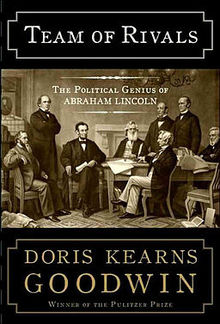
This is a fine book about Abraham Lincoln and the political competitors he employed in his cabinet as our 16th president. And Doris Kearns Goodwin is a great historian, a Pulitzer Prize winner for another book about Franklin and Eleanor Roosevelt.
But I’ve cracked it open at least twice, put it down, picked it back up, fished around at different ends looking for an interesting bite, and ultimately shut it up and put it back down.
Embarrassed to say it, I can’t get into its 757-page travels, not including a voluminous index.
This bothers me, though. I like to think I am attracted to and can absorb this kind of dive into U.S. history. I like to think I want to know more about Lincoln, the civil war, all the challenges of his life and times. I like to think all that, but when eyeball meets page with this one, it just hasn’t stayed there long.
Which I’ve determined is really nothing against the book and everything about my scattershot and depressing reading habits. Because now that I come to think of it, a biography of Truman bought long ago sits in a box somewhere, barely touched. Same, I think, for the aforementioned Roosevelt book by the same author, No Ordinary Time, although I might have tossed that one in the move, I don’t remember.
Sigh. I chalk it up to too much stimulation, too many options, of course, and too much life in the way — not lack of interest or motivation, oh noooo. Too much to read and rabbit holes to explore on the infernal YouTube. So much within such easy access now, so many newspapers and magazines and web stories — long reads, deep dives, New Yorker profiles that go on and on for days — to scramble a brain and scrap every good intention to, classically, be better well read.
It’s enough for me to just get through a skim of the Wall Street Journal during breakfast many days, maybe follow an interesting Twitter link for a quick sports, entertainment or politics read later on, and if I’m lucky knock out a few pages of whatever actual printed book I might have designs on “finishing,” haha.
I don’t like it, but it seems it’s the current state of Laissez-faire that not even the starburst of a New Year’s resolution is up to reversing. That is to say, honest, earnest, team-inspiring Abe is heading back to the library tomorrow.
In my heart, I believe I’ll catch up with him another time, although the big fella shouldn’t call me. I’ll call him.

